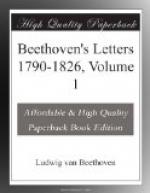[Footnote 3: Beethoven did not at that time know in what year he was born. See the subsequent letter of May 2, 1810. He was then far advanced in his thirty-third year.]
27.
NOTICE.
November, 1802.
I owe it to the public and to myself to state that the two quintets in C and E flat major—one of these (arranged from a symphony of mine) published by Herr Mollo in Vienna, and the other (taken from my Septet, Op. 20) by Herr Hofmeister in Leipzig—are not original quintets, but only versions of the aforesaid works given by the publishers. Arrangements in these days (so fruitful in—arrangements) an author will find it vain to contend against; but we may at least justly demand that the fact should be mentioned in the title-page, neither to injure the reputation of the author nor to deceive the public. This notice is given to prevent anything of the kind in future. I also beg to announce that shortly a new original quintet of my composition, in C major, Op. 29, will appear at Breitkopf & Haertel’s in Leipzig.
LUDWIG VAN BEETHOVEN.
28.
TO FERDINAND RIES.
Summer of 1803.
You no doubt are aware that I am here. Go to Stein, and ask if he can send me an instrument, on hire. I am afraid of bringing mine here. Come to me this evening about seven o’clock. I lodge in Oberdoebling, on the left side of the street, No. 4, going down the hill towards Heiligenstadt.
29.
TO HERR HOFMEISTER,—LEIPZIG.
Vienna, Sept. 22, 1803.
I hereby declare all the works you have ordered to be your property. The list of these shall be made out and sent to you with my signature, as the proof of their being your own. I also agree to accept the sum of fifty ducats for them. Are you satisfied?
Perhaps, instead of the variations with violoncello and violin,[1] I may send you variations for the piano, arranged as a duet on a song of mine; but Goethe’s poetry must also be engraved, as I wrote these variations in an album, and consider them better than the others. Are you satisfied?
The arrangements are not by me, though I have revised and much improved various passages; but I do not wish you to say that I have arranged them, for it would be false, and I have neither time nor patience to do so. Are you satisfied?
Now farewell! I sincerely wish that all may go well with you. I would gladly make you a present of all my works, if I could do so and still get on in the world; but—remember most people are provided for, and know what they have to live on, while, good heavens! where can an appointment be found at the Imperial Court for such a parvum talentum com ego?
Your friend,
L. V. BEETHOVEN.
[Footnote 1: These are the six variations in D, on the air Ich denke Dein written in 1800 in the album of the Countesses Josephine Deym and Therese of Brunswick.]




